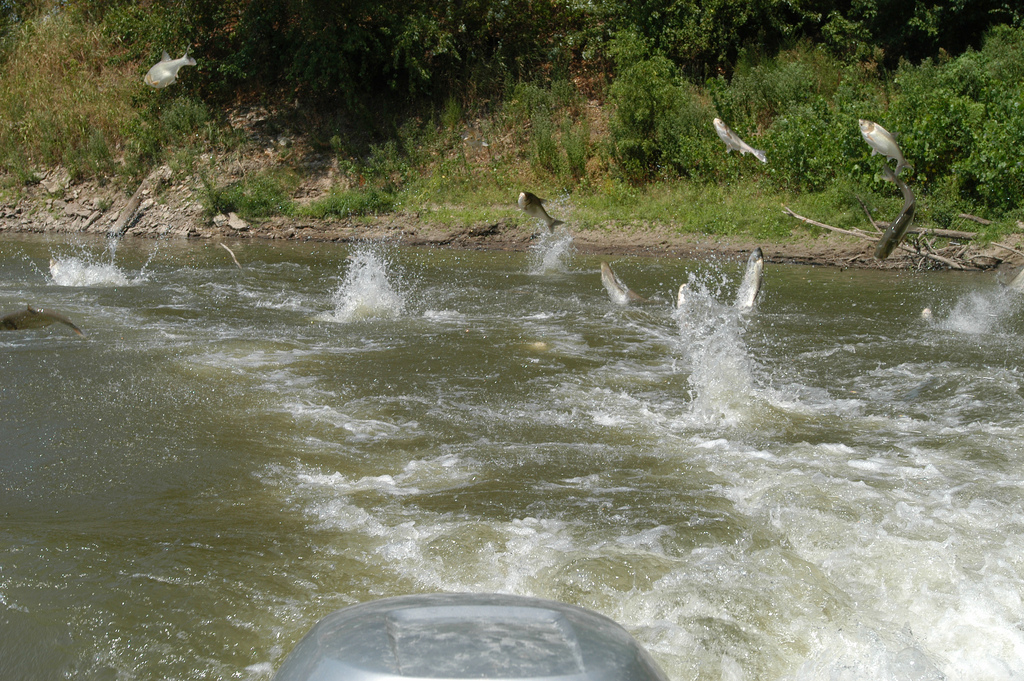Over 200 Hunting, Fishing, Conservation Groups Support Plan to Stop Asian Carp
‘Without firm and swift action to stop the further movement of Asian carp and other invasive species, the future of hunting, fishing and our outdoor heritage in the Great Lakes and Mississippi River region is at risk.’
ANN ARBOR, MICH. (February 22, 2019)— Over 200 hunting, angling, conservation and outdoor industry organizations submitted public comments today in support of the U.S. Army Corps of Engineers’ (Corps) final plan to improve defenses at the Brandon Road Lock and Dam to keep Asian carp out of the Great Lakes. The Brandon Road Lock and Dam, near Joliet, Ill., and below the Chicago Area Waterway System, is a chokepoint in the waterway system; the construction of new technology at the dam can help stop the advance of invasive Asian carp and reduce the risk of the fish entering Lake Michigan. The plan proposes a gauntlet of technologies including an electric barrier, a bubble barrier, acoustic deterrent, and a flushing lock to reduce the risk that Asian carp get through while still allowing navigation through the lock. The comment period closes today.
“Hundreds of groups representing millions of hunters and anglers in the Great Lakes region and across the country recognize that invasive species like Asian carp represent a clear and present danger to our nation’s fish, wildlife, water, economy, and way of life,” said Marc Smith, director of conservation partnerships for the National Wildlife Federation. “This plan is the best opportunity we’ll have to keep them out of the Great Lakes and their connected inland waters. This is a significant part of the national response needed to prevent Asian carp from invading new waters, while working to eradicate and suppress populations of the invasive fish from waters in which they currently reside.”
“We encourage you to consider our comments and move as fast and efficiently as possible to finalize this plan and submit to Congress on schedule,” the groups write. “We need stronger controls in place now in order to prevent Asian carp and other invasive species from continuing to swim closer to – and eventually into – the Great Lakes. Without firm and swift action to stop the further movement of Asian carp and other invasive species, the future of hunting, fishing and our outdoor heritage in the Great Lakes and Mississippi River region is at risk.”
Last week, a coalition of hunting, fishing, and conservation organizations in the Great Lakes region announced a united effort to support the plan to keep Asian carp out of the Great Lakes. Ducks Unlimited, the Indiana Wildlife Federation, the Izaak Watlton League of America, Michigan United Conservation Clubs, the Minnesota Conservation Federation, the National Wildlife Federation, Ohio Conservation Federation, Trout Unlimited and the Wisconsin Wildlife Federation formed the Great Lakes Conservation Coalition to unite support for efforts to stop Asian carp.
NOTE: This press release was submitted to Urban Milwaukee and was not written by an Urban Milwaukee writer. While it is believed to be reliable, Urban Milwaukee does not guarantee its accuracy or completeness.
Mentioned in This Press Release
Recent Press Releases by National Wildlife Federation
Over 200 Hunting, Fishing, Conservation Groups Support Plan to Stop Asian Carp
Feb 22nd, 2019 by National Wildlife Federation‘Without firm and swift action to stop the further movement of Asian carp and other invasive species, the future of hunting, fishing and our outdoor heritage in the Great Lakes and Mississippi River region is at risk.’
Statement: National Wildlife Federation Supports Updated Plan to Stop Asian Carp
Nov 21st, 2018 by National Wildlife FederationThe invasive species is a clear and present danger to the Great Lakes sport-fishery, which is estimated to generate at least $7 billion each year in economic activity.
50 Sportsmen’s Groups Support Swift Action on Asian Carp Plan
Dec 8th, 2017 by National Wildlife FederationHunters, anglers, conservation groups support the Army Corps of Engineers Brandon Road plan.





















